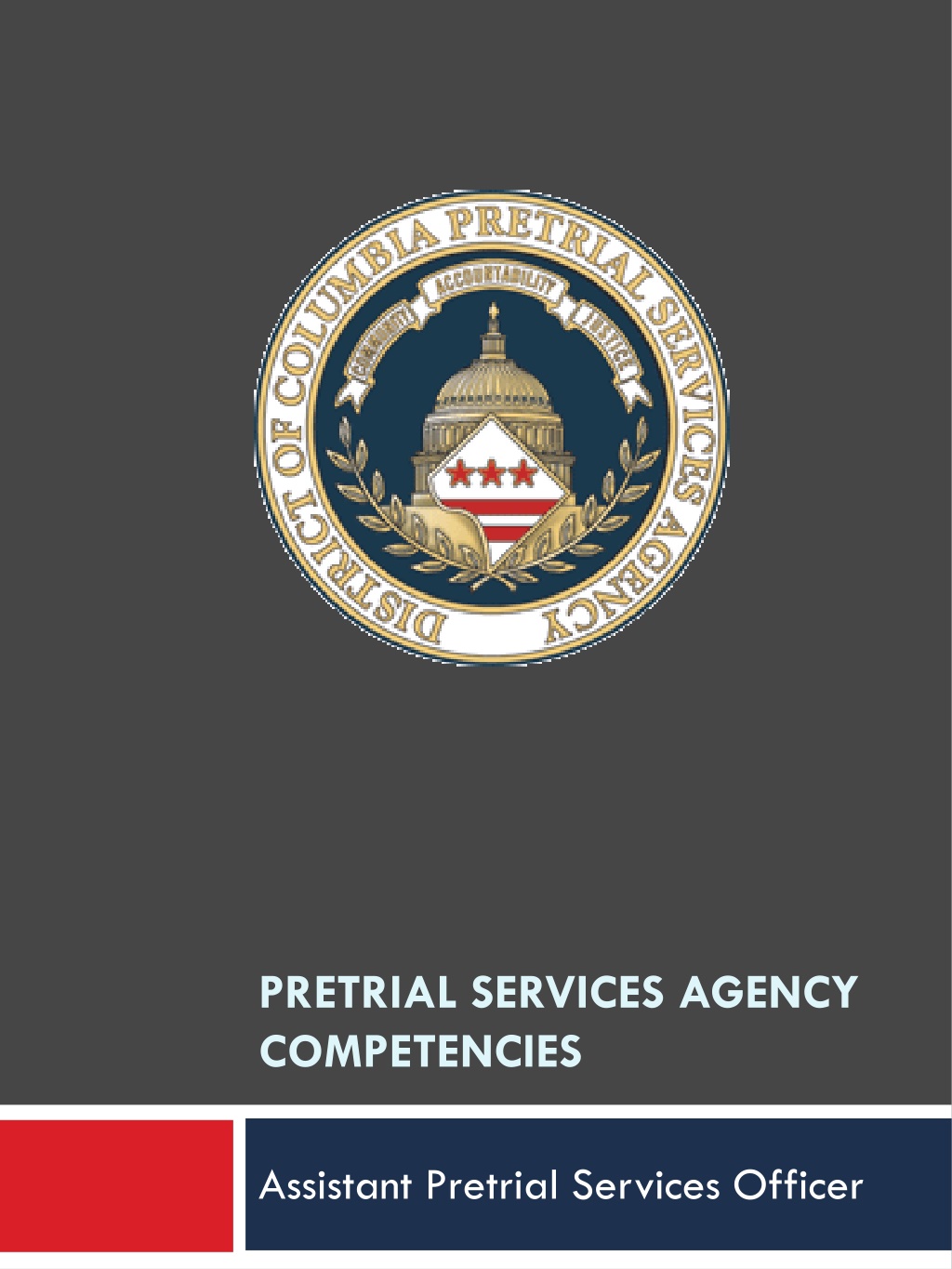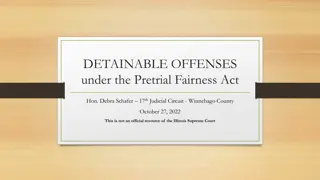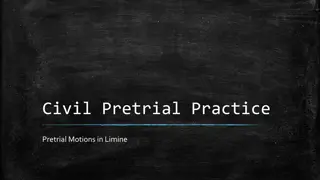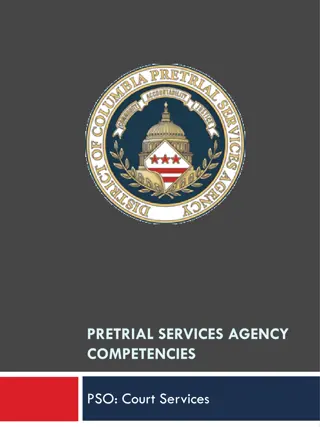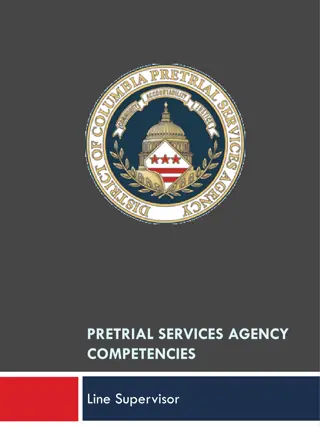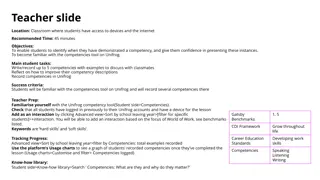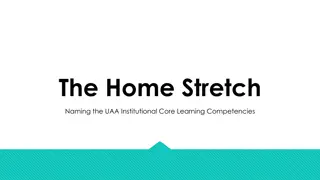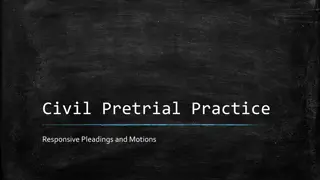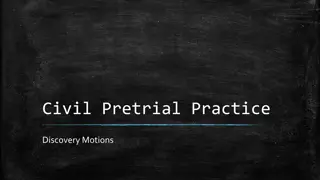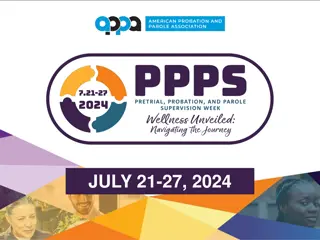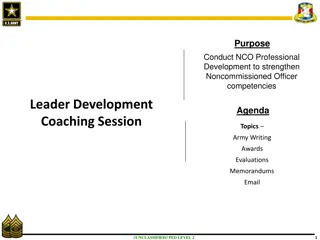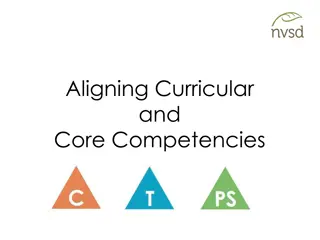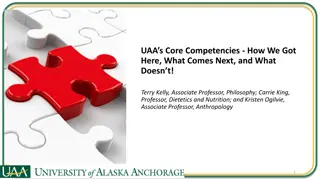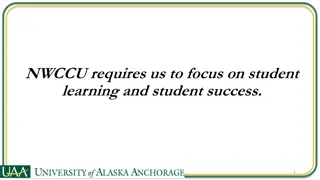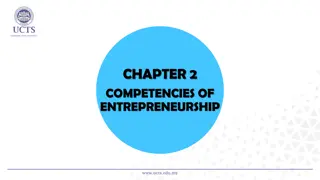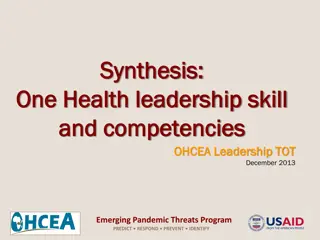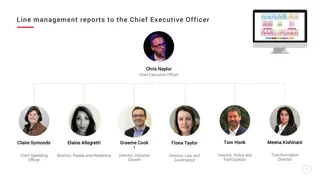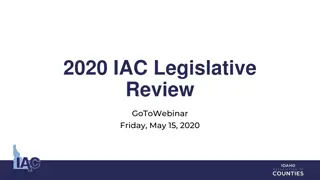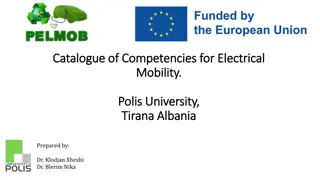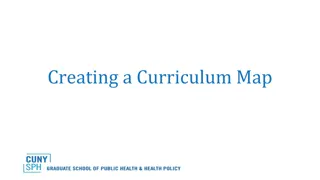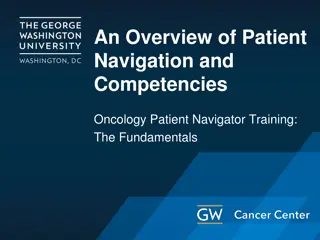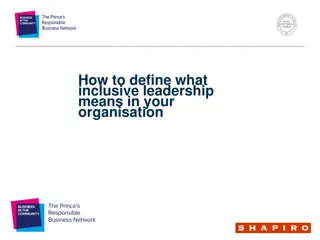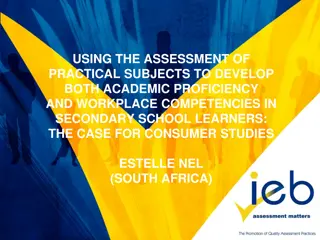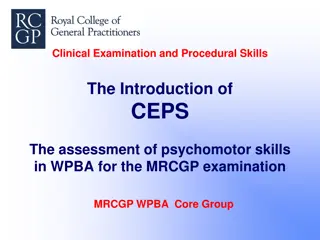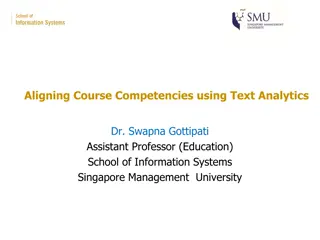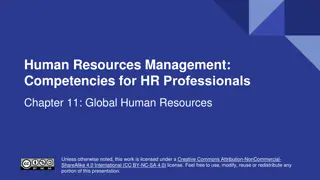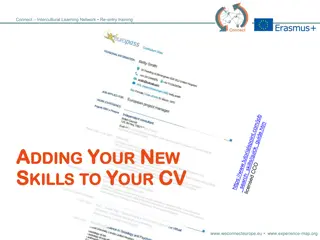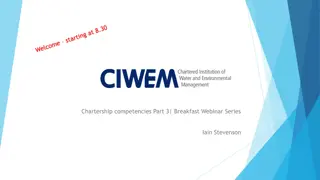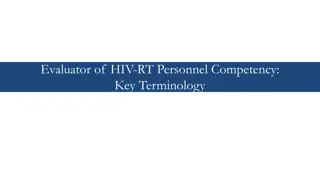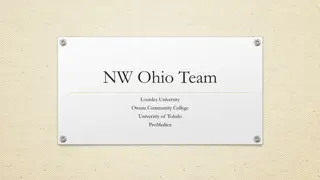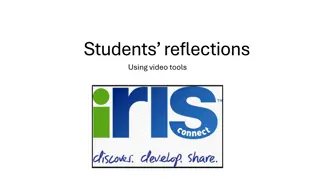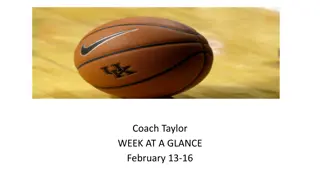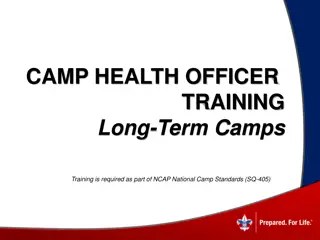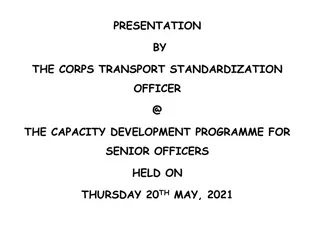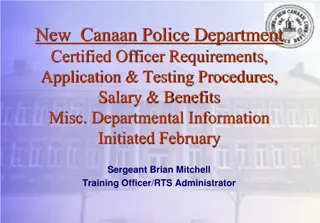Assistant Pretrial Services Officer Competencies
Assistant Pretrial Services Officers are required to demonstrate knowledge and proficiency in various competencies such as supervision procedures, court services, drug testing protocols, technical expertise, organizational knowledge, and communication skills. They handle tasks related to supervising defendants, processing new defendants, managing case files, reporting violations, and court documentation. The officers are expected to meet or exceed expectations by accurately following protocols and procedures, utilizing automated systems effectively, and providing detailed and timely reports to the courts.
Download Presentation

Please find below an Image/Link to download the presentation.
The content on the website is provided AS IS for your information and personal use only. It may not be sold, licensed, or shared on other websites without obtaining consent from the author. Download presentation by click this link. If you encounter any issues during the download, it is possible that the publisher has removed the file from their server.
E N D
Presentation Transcript
PRETRIAL SERVICES AGENCY COMPETENCIES Assistant Pretrial Services Officer
Assistant Pretrial Services Officer 2 *Knowledge of Supervision Procedures and Protocol *Knowledge of Court Services Diagnostic Function *Knowledge of Drug Testing and Compliance Unit Procedures and Protocol APSO Technical Expertise System and Regulatory Knowledge PSA Organizational Knowledge Computer Proficiency Interpersonal Skills Teamwork Customer Service Orientation Initiative Conscientiousness Planning and Organizing Critical Thinking and Problem Solving Adaptability Communication *Note: Applicable only if assigned to this unit or program
Knowledge of Supervision Procedures and Protocol Completes APSO level work as assigned in supervision. Understands relevant procedures for processing new defendants with release conditions. Utilizes automated systems to correctly determine active warrant and criminal history status. Demonstrates an understanding of compliance review procedures and protocol for supervising defendants. Manages case files, reports and records around supervision accurately and according to established PSA supervision protocols. Understands proper procedures for reporting violations of release conditions. Identifies defendants who would benefit from referral for additional services and is able to complete the referral. Creates and submits timely and accurate court reports, informing courts of release condition compliance. Effectively reports defendant compliance and other information during court hearings when required. Does Not Meet Expectations Fails to fully understand or follow basic procedures for processing defendants in typical/routine situations. Meets Expectations Exceeds Expectations Sees intricacies in processing defendants with unique or unusual circumstances and effectively manages complex, atypical situations. Takes initiative to use multiple resources and research beyond basic facts to capture additional detailed, relevant data. Understands basic procedures for processing defendants in typical/routine situations. Demonstrates a lack of understanding of how to use automated systems to determine active warrant and criminal history status, or fails to capture important related information. Misses some critical procedures or processes for reporting violations when supervising defendants in typical situations. Utilizes automated systems to correctly determine active warrant and criminal history status. Follows proper compliance review procedures when supervising defendants in typical situations. Understands complex and atypical procedures for supervising defendants and reporting violations of release conditions in unusual or complex situations. Records basic as well as detailed notes and information that maximizes the usefulness of case files. Recognizes potential problems and effectively manages additional recommendations or referrals in atypical situations. Case files are not accurate or do not contain required, basic information. Maintains accurate case files that are complete with all basic required information. Identifies defendants who would benefit from referral to the SSAC, a community based organization, or elsewhere and is able to complete the referral in routine situations. Creates and submits timely and accurate court reports, informing courts of release condition compliance, including re-arrest. Fails to identify defendants who would benefit from referral to the SSAC, a community based organization, or elsewhere or is unable to complete the referral in routine situations. Fails to create and submit timely and accurate court reports, informing courts of release condition compliance, including re- arrest. Creates and submits reports that are especially thorough and include ancillary relevant information; is able to customize reports providing information known to be relevant to particular judicial officers; provides reports in advance of deadline and provides updated information to the court representative on the day of the hearing when necessary. Is especially effective when representing in court, including being able to answer unexpected judicial inquiries; displays extra effort to ensure that information presented to court is up-to-date. Fails to effectively report defendant compliance or other important information during court hearings when required. Is able to effectively report defendant compliance and other information during court hearings when required.
Knowledge of Court Services Diagnostic Function Completes APSO level work as assigned in Court Services. Conducts criminal background investigations and analyzes data at the level necessary for a given situation. Has an understanding of protocol and procedures for researching relevant background information and providing documentation regarding the least restrictive recommendations for release conditions. Understands and can explain details of relevant programs and release conditions and circumstances in which each should or should not be applied (e.g., depending on charges, detention holds, repeat offenses). Knows differences in procedures for relevant District, Superior and Traffic courts as well as unique types of cases (e.g., sealed cases). Knows and applies the Agency s Risk Assessment Protocol. Knows supervision procedures and protocols within PSA necessary to process defendants, including how to make a determination of whether a defendant is in compliance with conditions of release. Understands relevant information technology systems used to conduct investigations. Understands laws and statutes related to detention eligibility. Does Not Meet Expectations Misses key elements of standard background check protocols or does not obtain required information completely at times. Meets Expectations Exceeds Expectations Conducts unique or complex background investigations; goes beyond initial facts to uncover information not immediately obvious to less experienced PSOs; takes initiative to overcome obstacles and obtain additional information that could be beneficial in a background investigation. Asks probing questions or evaluates available data more carefully to better understand optimal release conditions and identify or recommend appropriate courses of action; may address inconsistencies or release conditions tactfully with others when more appropriate alternatives are available. Goes beyond required steps to conduct and thoroughly document relevant, extensive background investigations; interprets complex or atypical background data effectively. Persuasively presents a case to support a modification or alternative approach to release conditions with others even when they may initially disagree. Recognizes when additional questions or questioning strategies would be beneficial; probes with additional approaches to uncover facts. Recognizes when defendants may be eligible for multiple statutory requirements; identifies statutory references in unusual or atypical cases. Takes initiative to use multiple resources and research beyond basic facts to capture additional detailed, relevant data. Conducts routine background investigations according to established protocols and obtains basic, required information for records. Fails to correctly interpret release conditions or recommends conditions that are not consistent with PSA mission/policy and/or a judge s orders given a defendant s history and circumstances. Reads and understands information about release conditions; implements release conditions consistent with a judge s orders and generally recommends conditions based on the risk score. Does not document all basic required background information completely or accurately at times. Takes some initiative to identify and accurately document all basic, required background information. Fails to provide sufficient background check data to adequately support release conditions. = Describes recommended release conditions and can provide some basic information from background check to support recommendation. Asks standard questions and documents a defendant s response accurately. Fails to ask important questions from standard interview protocol or does not completely document responses provided. Fails to recognize when a statutory reference is needed or provides the wrong reference. Appropriately identifies a relevant statutory reference for defendants who are eligible for detention in a typical case. Demonstrates a lack of understanding of how to use primary background check systems or fails to capture important criminal history facts. Utilizes primary background check systems and processes effectively to capture basic criminal history facts.
Knowledge of Drug Testing and Compliance Unit Procedures and Protocol Has an in-depth understanding of Drug Testing and Compliance unit structure and operations. Understands relevant procedures and processes for performing check-in for defendants being tested. Knows relevant systems and processes for reviewing and correcting information on release conditions. Understands and applies correct procedures and protocols for escorting and observing defendants being tested. Enters authorized defendant information and medications into the appropriate systems following established unit policies and procedures. Applies proper chain-of-custody procedures and in-unit collection procedures when handling samples. Does Not Meet Expectations Knowledge of Drug Testing and Compliance unit structure and operations is limited such that employee has some difficulty performing basic functions and responsibilities. Meets Expectations Exceeds Expectations Shows strong knowledge of the Drug Testing and Compliance unit structure and operations to complete responsibilities, follow all regulations and guidelines, and obtain all needed information from others in complex or atypical situations. Is able to handle check-ins for unusual cases or situations following all procedures and protocols, with high levels of accuracy; proactively identifies situations that could present problems in applying proper procedures and protocol for processing defendants. Is able to apply and utilize relevant systems and procedures accurately for both standard and unusual defendant cases. Follows proper protocol for escorting and observing defendants being tested, and correctly applies procedures for collecting samples in all cases, handling unusual situations with ease. Is able to identify his/her own or others inconsistencies in processing defendants, applying chain-of-custody procedures, and collecting samples, and takes or suggests corrective actions. Enters defendant information accurately with no mistakes. Has sufficient knowledge of the Drug Testing and Compliance unit structure and operations to complete most responsibilities, follow most regulations and guidelines, and obtain basic information from others. Requires assistance from others, makes consistent mistakes, or takes significant time, to check in and process defendants; recognizes potential problem situations but does not respond or take corrective actions. Understands and applies procedures for checking in defendants with acceptable timeliness and quality, making only occasional mistakes or needing only occasional assistance. Does not fully understand manual systems used for data entry, or consistently makes mistakes in data entry that require correction by others. Does not frequently follow unit protocol and procedures for escorting and observing defendants being tested. Uses relevant systems (e.g., Courtview) for checking the accuracy of information on release conditions for standard cases. Escorts and observes defendants being tested following proper procedures and protocol for most standard cases. Has difficulty handling samples for the most basic, standard cases; does not understand or fully follow chain-of-custody and in-unit collection procedures. Handles samples for standard cases following appropriate chain-of-custody and in-unit collection procedures. Does not follow established unit policies or procedures, or makes significant number of errors, when entering defendant information and medication into unit systems. Does not recognize when he/she lacks information or expertise, does not seek further assistance, and makes subsequent mistakes in his/her work. Enters appropriate defendant information into appropriate systems correctly in many instances. Recognizes when he/she lacks information or expertise and seeks assistance when appropriate. Serves as a resource or guide for others who have questions about procedures, protocol, regulations, or systems; helps train others; is recognized as an expert.
APSO Technical Expertise Understands and follows/applies the policies, procedures, and protocol for the unit or program to which he/she is assigned. Provides assistance to employees in a unit or program. Knows and understands relevant legal regulations and statutes governing work in a particular unit or program. Knows and applies correct procedures and protocols for conducting relevant record checks. Does Not Meet Expectations Fails to demonstrate a basic understanding of policies, procedures, and protocol for the unit/program to which he/she is assigned. Meets Expectations Exceeds Expectations Knows more advanced or unusual procedures and protocol and readily assists PSO on both routine and more complex issues at times; takes independent initiative to stay up to date on new policies or policy changes. Knows more advanced aspects of relevant legal regulations and statutes governing work in his/her unit or program; knows aspects that apply to atypical or more complex situations. Knows procedures and can conduct more complex, unusual, or high profile record checks effectively; can utilize multiple systems and resources to thoroughly complete checks. Knows typical policies, procedures and protocol for the unit/program to which he/she is assigned and can fill in for a PSO at times in typical day-to-day situations; generally reviews policy change documents and applies changes correctly. Demonstrates a basic understanding of relevant legal regulations and statutes governing work in his/her unit or program; knows those aspects typically encountered in day-to-day work. Knows and applies correct procedures for conducting routine record checks. Fails to demonstrate a basic understanding of relevant legal regulations and statutes governing work in his/her unit or program. Does not know proper procedures at times for conducting routine record checks or fails to research information to complete more advanced record checks effectively.
System and Regulatory Knowledge Exhibits an understanding of relevant aspects of DC Superior Court and/or US District Court system operations, structure, and/or processes. Understands the relevant operations of local surrounding law enforcement agencies and/or judicial systems (e.g., those relevant to a specific job such as Metropolitan Police Department, Virginia law enforcement, Probation and Parole, U.S. Capital Police, U.S. Park Police, U.S. Marshal Service, other pretrial agencies) in order to obtain and share information related to supervision, treatment, drug testing, and/or monitoring of defendants. Displays an understanding of federal, state, district, and agency policies, regulations, and laws regarding the safekeeping and release of the Agency s information (e.g., personally identifiable information (PII), FOIA, treatment information, mental health information, etc.). Understands and follows federal records management laws. Does Not Meet Expectations Fails to follow standard and expected protocols or demonstrate a basic understanding of Court functioning for routine situations. Does not understand basic information about operations, procedures, or protocol of surrounding law enforcement agencies relevant to his/her role. Meets Expectations Understands basic operations, structure and procedures of DC Superior Court and/or US District Court system relevant to his/her role. Demonstrates an understanding of basic operations of local surrounding law enforcement agencies relevant to his/her role in typical situations. Exceeds Expectations Utilizes detailed understanding of Court operations, structure, and procedures to adjust strategies and approaches in different situations. Has a detailed level of understanding of relevant law enforcement agency operations or protocol and uses this knowledge to overcome challenges and facilitate outcomes for self or others. Has an advanced knowledge of the Agency s records and information policies, regulations and laws; serves as a resource to others who have questions regarding records and information procedures. Maintains records according to applicable federal records management laws; researches to determine proper record keeping for unusual, complex, or difficult cases; takes initiative to identify problems regarding records management and assists in finding solutions. Fails to understand or apply a basic knowledge of relevant policies, regulations, and laws regarding confidentiality, safekeeping and releasing of the Agency s information. Understands and applies a basic knowledge of relevant policies, regulations, and laws regarding confidentiality, safekeeping and releasing of the Agency s information. Records are not maintained according to applicable federal records management laws; needs much assistance with maintaining records. Maintains records according to applicable federal records management laws; may have to seek assistance regarding record keeping or maintenance for unusual, complex, or difficult cases (e.g., retention schedules for less common records, handling of confidential records, etc.).
District of Columbia Pretrial Services Agency (PSA) Organizational Knowledge Understands and is able to communicate the vision, mission, and strategy of the PSA and how one s work aligns with and integrates with other PSA programs and services. Has an understanding of how and why the PSA was established, including District of Columbia Superior Court and US District Court bail laws (e.g., The Bail Reform Act). Understands PSA s various offices, programs, structure, and functions, and utilizes this knowledge to obtain information, or make suggestions, recommendations, or decisions. Does Not Meet Expectations Does not demonstrate an understanding of fundamental PSA history, vision, mission, strategy or objectives relevant to accomplishing his/her work; takes actions that are not consistent with PSA strategy and mission. Meets Expectations Understands the PSA vision, mission, strategy, or objectives relevant to accomplishing his/her work (e.g., basic purpose and background of PSA); understands how units within PSA contribute to the mission and objectives, and makes recommendations that are consistent with the Agency s mission. Shows basic awareness of the various offices, core programs, functions, and structure of PSA operations necessary to secure resources, make recommendations, or answer routine questions. Exceeds Expectations Takes initiative to align work to support objectives and mission of PSA and other units or programs; emphasizes PSA s mission and background at appropriate times (e.g., in defending recommendations) Demonstrates limited understanding of the broad scope of PSA functions, programs, services, and structure outside of his/her work unit; does not utilize programs offered by other programs or units effectively; lack of knowledge impacts quality of service provided and information provided to external stakeholders. Is seen as a subject matter expert whom others go to for advice or questions about specific areas of PSA s structure or programs outside of his/her work unit; able to answer difficult questions about multiple PSA programs and services.
Computer Proficiency Utilizes Microsoft Office tools (Outlook, Word, Excel, and PowerPoint) required to perform job duties such as writing reports and letters, creating and updating logs, or producing presentations when necessary. Performs basic computer operations (e.g., accessing drives). Maintains a knowledge of, accesses and uses relevant systems needed to perform job duties (e.g., PRISM, Courtview, JACCS, SMART, PACER, e-Agent, WALES, outside agency websites, NCIC, RMS, JUSTIS, G4S, OMNIlink, Accucare; DTMS, Track-it). Does Not Meet Expectations Has difficulty using some of the basic, core functions of Microsoft Office relevant to the job; has to rely on others for assistance on a consistent basis. Meets Expectations Effectively uses most basic functions and capabilities of Microsoft Office tools relevant to completing his/her work responsibilities. Exceeds Expectations Shows understanding of advanced Microsoft Office applications and programs relevant to the job; utilizes advanced knowledge to assist others who have questions about Microsoft Office. Demonstrates more advanced computer- related expertise that facilitates getting work done faster or more efficiently; answers questions or provides others assistance on computer operations. Shows expertise in functionality of specific computer systems; coaches others on their capabilities or how to navigate or effectively utilize different computer systems to facilitate completing work more effectively. Frequently requests assistance on the most basic computer operations; has difficulty learning or navigating the computer environment and accessing different drives. Does not effectively use some basic internal or external computer systems that are needed to perform work. Understands how to access and navigate different internal drives, unit folders, personal work folders, etc., within a computer environment needed to perform day-to-day work. Understands the core, most often used computer systems needed to perform his/her work; is efficient and effective at retrieving most basic information; understands the purpose and application of each of the different systems.
Interpersonal Skills Fosters relationships; builds rapport with others from various demographic backgrounds (e.g., educational, socioeconomic, racial, etc.) and individuals who have varying personal histories and personalities. Shows sensitivity to others needs, opinions, background, circumstances, and concerns. Maintains appropriate objectivity in situations. Resolves conflicts or disagreements in a constructive way. Demonstrates an appreciation for differences in perspectives and opinions. Does Not Meet Expectations Shows difficulty building effective rapport with others. Meets Expectations Uses various approaches and strategies to build rapport with those of varying backgrounds, histories, and personalities. Is accepting of others differences or perspectives; maintains objectivity and a respectful approach regardless of someone s personal circumstances or demeanor. Exceeds Expectations Develops effective working rapport with the most challenging, resistant, or difficult individuals. Takes steps to better understand the potential causes of difficult/challenging behavior and adjusts approach to promote positive outcomes when possible by utilizing additional alternatives. Fails to demonstrate sensitivity to others personal challenges or perspectives; inappropriately criticizes others for their differences or fails to promote a respectful, professional environment for others. Uses an inappropriate manner, style, or tone/language when disagreeing or enforcing policies with others; may escalate situations unnecessarily. Uses an appropriate manner, style, or tone/language when disagreeing or enforcing policies; provides alternative solutions to resolve disagreements when possible. Makes repeated attempts to overcome resistance from others and obstacles to getting agreement; is often able to gain commitment from others in challenging or emotionally charged situations; serves as a resource to help others work through difficult interpersonal situations and utilizes conflict resolution to resolve issues. Is resourceful in using ideal approaches to overcome objections or promote accountability in the most difficult situations; provides guidance to others on how to effectively manage difficult interpersonal situations. Provides ongoing support and/or guidance to others on how to maintain professional objectivity in particularly difficult or emotional situations. Fails to listen or acknowledge others points of view and fails to resolve disagreements/ conflicts effectively as a result. Acknowledges another person s perspective while working through challenges to gain commitment to a course of action for positive outcomes. Lacks professionalism at times or lacks objectivity when interacting with others. Demonstrates professionalism and builds ongoing rapport with others while maintaining professional objectivity to enhance positive attitude and environment.
Teamwork Develops and maintains positive and professional working relationships with coworkers. Collaborates, supports, and cooperates with others to accomplish Unit and Agency goals. Readily shares relevant information, knowledge, and ideas with team members when appropriate. Ensures others are kept informed when necessary and involves the appropriate individuals in key decisions when needed. Follows through with commitments to the team and can be relied upon to complete own responsibilities Does Not Meet Expectations Speaks to others in a disrespectful or curt tone or voice; shows difficulty working with or getting along with others. Meets Expectations Exceeds Expectations Builds strong relationships with others consistently; overcomes interpersonal challenges or differences of opinion to enhance productivity within a team. Takes initiative to promote better cooperation among the team; helps keep team morale up, and is always willing to help, rotate, and share responsibilities with others; motivates, encourages and helps cultivate a team environment that is friendly and cohesive. Proactively seeks out and shares and thoroughly explains information and resources that can help coworkers. Recognizes when others are struggling, or consistently takes the initiative to ask if others need help, support, or assistance; volunteers to participate on work groups, teams, or unit-wide projects. Manages workload and finds efficiencies, takes extra initiative, and uses time well so that he/she is also available to support others when needed. Frequently expresses appreciation, gives credit to others, and promotes others contributions to the work team. Uses a respectful, courteous tone of voice when communicating and maintains an effective working relationship with coworkers and colleagues. Works collaboratively and shares responsibilities with coworkers when appropriate to accomplish unit and group goals; supports unit and group mission with a positive attitude and takes responsibility for work outcomes. Does not follow through on commitments to others or takes actions that inhibit others from completing work effectively. Fails to keep others informed of important information that impacts their work. Shares important information that impacts others work in a timely manner. Declines or continues with his/her own tasks when asked to help others on higher priority problems; rarely if ever participates on work groups, teams or unit wide projects. Over-relies on others to accomplish his/her work, and/or leaves work for others to complete that he/she could have accomplished. Rarely expresses appreciation, does not acknowledge others contributions, or fails to share credit with others when appropriate. When asked, helps and provides assistance to others or participates on work groups, teams, or unit-wide projects. Generally completes his/her workload in a group; does not over-rely on others for assistance or frequently need others to help complete his/her responsibilities. Generally expresses appreciation, acknowledges others contributions, and/or shares credit with others.
Customer Service Orientation Is helpful and responsive to relevant internal (e.g., individuals who call the office, other Agency staff) and/or external (e.g., outside agency personnel, defendants) customers or stakeholders. Solicits and/or incorporates internal and external customer feedback if appropriate. Demonstrates sound judgment within established guidelines to resolve customer-related problems. Treats customers courteously and attempts to respond to their needs in a timely manner. Builds relationships with other agencies and partners and uses these resources efficiently and effectively to achieve objectives. Shares information with other agencies when appropriate and responds promptly, thoughtfully and thoroughly to other agencies requests or needs. Does Not Meet Expectations At times, speaks to customers in a disrespectful or unprofessional tone or voice that makes the situation worse. Meets Expectations Uses respectful and courteous tone and language when communicating with customers; remains professional in situations that require him/her to be more directive with customers. Researches problems and provides customers with the information, services, answers, or work that they request on time and within unit or PSA guidelines. Exceeds Expectations Provides assistance to others on how to interact with customers respectfully; helps solve difficult customer problems when appropriate so that problems are resolved at the lowest level possible. Goes beyond customers stated requests to independently identify additional information or actions that may be beneficial, and works to deliver those; regularly balances customer and Agency goals and provides service that exceeds customers expectations. Uses customers suggestions or feedback, when appropriate, to suggest or implement improvements to services or products. Asks questions to understand customers complaints or requests; explains reasons for decisions, rules, and actions, yet also looks for possible alternative solutions to meet same needs. Builds a network of relationships with key contacts at outside agencies and uses contacts effectively to obtain information; helps others obtain information or build professional networks. Takes initiative to help individuals at other agencies and offers additional information or suggestions to help them better resolve a problem or question. Fails to take sufficient initiative to meet or follow up on customers requests or needs, or goes outside of accepted PSA or unit standards and regulations when responding to customers. Does not take notes of or respond to customer feedback or complaints; does not communicate complaints to appropriate personnel. Fails to provide information that customers need, or denies their request without appropriate explanation or clarification. Listens openly to customers feedback and complaints, notes the feedback when appropriate, and refers to the appropriate person. Gives customers the information that they need; offers relevant reason or policy when denying customers requests. At time, fails to identify the right resources or build rapport to obtain information needed from external agencies or partners. Identifies the right agency or partner to contact and builds rapport with individuals at outside agencies to obtain information or solve problems effectively. Fails to follow through consistently with requests from other agencies; his/her response is not complete or timely. Shares appropriate information with other agencies in a timely manner as requested.
Initiative Takes appropriate levels of independent action to identify opportunities, solve problems, and/or complete work. Provides feedback on procedures and offers suggestions and change ideas. Seeks assistance when encountering difficult situations and asks for help at appropriate times. Shows tenacity and perseverance in achieving objectives; stays focused and persistent and remains committed to objectives despite obstacles. Maintains a positive outlook and stays motivated when dealing with difficult individuals/situations or when things do not go as planned or recommended. Does Not Meet Expectations Waits for others to provide direction, give instructions, ask for help, or assign a task, before taking action on some day-to-day responsibilities; does not act independently at the appropriate times. Uses an inefficient process that impacts effectiveness without alerting others to potential problems; fails to offer suggestions or opinions about improvements when asked. Does not seek assistance with unusual or difficult situations, when it would be appropriate to do so. Meets Expectations Does not require constant direction to complete his/her routine responsibilities; does what is expected of him/her on the job without having to be asked. Exceeds Expectations Readily takes on both routine and challenging assignments without having to be asked; does more than is expected; identifies what needs to be done and does it. Proactively suggests specific ways to improve a process or work activity; takes on extra responsibility without being asked. When asked, provides an opinion about how to improve a process. When appropriate, seeks assistance from others to address unusual or difficult challenges. Proactively identifies an individual who may be able to provide assistance on a difficult or unusual task; does not wait until problems are experienced. Proactively identifies problems and offers multiple possible solutions to his/her supervisor; researches and makes recommend an ideal best solution for the situation; when appropriate, may try out solution on his/her own. Consistently stays focused, motivated, and positive despite difficult obstacles and challenges; overcomes challenges or constraints with resourcefulness, perseverance, or considerable effort. Often points out work-related problems without taking initiative to identify a solution when he/she could. Sometimes identifies a possible alternative or solution to a problem; may rely on supervisors to provide input or identify the best option. Shows frustration/pessimism, loses motivation, or tends to quickly give up on a task when encountering obstacles or setbacks; makes excuses or fails to take appropriate initiative to overcome challenges and ensure timeliness and quality of work. Does not accept appropriate responsibility for missed deadlines, mistakes, or performance/quality problems. Shows minimal frustration despite day-to- day challenges or changes; takes some effort to overcome or get assistance to deal with a setback or challenge to ensure timeliness and quality of work. Takes appropriate responsibility for mistakes, performance/quality issues, or missed deadlines when they occur and avoids making similar mistakes in the future. Takes appropriate responsibility for mistakes, performance issues, or missed deadlines, and shows initiative to develop skill or adjust approaches to avoid recurrences and enhance performance.
Conscientiousness Makes and honors commitments; follows through consistently. Attends to important details. Stays on top of activities to ensure appropriate and timely follow through. Produces work that meets Unit objectives, Agency standards, and/or customer expectations. Follows policies, procedures, guidelines, rules and regulations, including Management Instructions or directives and safety procedures and protocols. Recognizes situations that may require flexibility or a modification of an existing procedure, and seeks approval for changes at the appropriate times. Does Not Meet Expectations Fails to follow through consistently with commitments; may take more time than allocated to complete work assignments or miss critical deadlines. Meets Expectations Generally follows through with commitments; gets work done within the allotted time frame, and keeps others informed of progress or potential problems when appropriate. Completes most work with minimal or no errors and omissions. Exceeds Expectations Frequently exceeds others expectations for follow through; completes work ahead of deadlines and makes adjustments or shows extra initiative to ensure commitments are met when necessary. Details of work are consistently complete, accurate, and thorough; provides more relevant information and explanation than what is specifically required. Takes independent initiative to research and learn more about policies or regulations or seek other perspectives to ensure work, decisions, and recommendations are compliant even in unusual or complex situations. Acts quickly to remove or avoid conditions that cause potential for safety concerns; independently intervenes to diffuse unsafe situations and or deescalate interactions with belligerent, upset, or hostile individuals. Proactively identifies situations ahead of time that may require modification or improvement of a procedure, rule, or policy in order to ensure task completion. Work contains critical or considerable errors or omissions of basic, key details at times. Produces work or makes decisions that are not consistent with relevant policies, procedures, guidelines, rules or regulations at times; fails to learn or implement new directives. Produces work that generally follows standards, policies, procedures, guidelines, and rules and regulations; learns and applies new directives effectively. Does not consistently apply safety principles and practices to ensure the safety of his/her work environment; acts in an unsafe manner at times or rarely intervenes to diffuse situations. Takes and applies safety training to ensure he/she performs work in a safe manner. May not provide input when a procedure needs to be modified to accomplish a task; sticks with an existing procedure that is causing timeliness and/or quality problems without making suggestions for improvement. When asked, provides input into modifying a procedure, rule, or policy after having encountered an obstacle or problem.
Planning and Organizing Collects, organizes, and manages records or files efficiently, completely, and promptly. Effectively and efficiently utilizes the time available within the standard workday to organize, prioritize and accomplish day-to-day job duties. Prioritizes work appropriately according to task urgency and importance and reprioritizes as necessary. Balances multiple priorities and assignments simultaneously. Ensures individual activities receive appropriate attention to quality/timeliness when completing multiple tasks at the same time. Does Not Meet Expectations Files or records are incomplete, confusing, or fail to meet required standards. Meets Expectations Generally meets required standards for maintaining files or records. Exceeds Expectations Keeps detailed, complete, up to date information in files or records consistently; organizes records in a way that enables others to easily find information. Work is exceptionally well organized and frequently completed ahead of schedule as a result. Restructures work, proactively researches information, or suggests changes to work processes that maximize productivity and efficiency. Works efficiently, gets work done ahead of schedule, and as a result is often available to provide others with assistance with unexpected, urgent issues. Proactively develops organizing processes that enable him/her to manage numerous priorities simultaneously. Misses deadlines that are within his/her control. Generally meets deadlines that are within his/her control. Does not maintain a steady work pace, and workload becomes significant at times as a result. Works at a steady pace to complete daily priorities. Does not address priorities effectively; may fail to handle the high priority items with appropriate sense of urgency. Generally makes the right decisions about work priorities to ensure the highest priority issues are handled first. Works on activities one at a time, and fails to complete some items that should be addressed as a result. Balances multiple activities when necessary and tracks items to ensure completion of time-sensitive items.
Critical Thinking and Problem Solving Exercises sound judgment across situations, synthesizing information and assessing relevant input and data to respond to questions and make appropriate decisions based on available information. Considers potential consequences of a course of action prior to making a decision. Seeks input or approval from others when necessary. Gathers relevant data, asks probing questions, and secures additional information in order to understand a problem or situation. Generates viable solutions to problems. Does Not Meet Expectations Asks the same question repeatedly at times; fails to learn from experiences and apply to new situations. Meets Expectations Effectively solves routine problems within his/her authority and learns from experiences to apply to future situations. Exceeds Expectations Synthesizes complex data and information, identifies viable solutions, and solves challenging or unusual problems effectively. Drives ideal solutions to challenging problems based on a thorough analysis of complex information and considerable professional expertise, even under pressure. Researches a situation, asks probing questions to uncover less obvious issues or problems, and secures information to generate a possible solution or recommendation that can be taken to his/her supervisor for approval. Consistently makes decisions in unusual or difficult situations that are logical and consistent with relevant policies and procedures; seeks approval at the appropriate times. Over relies on others to solve problems that he/she should be able to solve. Solves day-to-day problems without unnecessary oversight from others; asks for input to solve problems at the appropriate times. Fails to ask key questions or does not gather basic facts and information necessary to effectively solve a problem. Gathers the basic information needed to solve day-to-day problems effectively. Decisions are at times inconsistent with relevant policies and procedures, or not well thought out with available information about a situation. Consistently makes decisions in routine situations that are logical and consistent with relevant policies and procedures; seeks approval at the appropriate times.
Adaptability Continually develops relevant Agency and/or professional knowledge and skill. Listens to and learns from constructive feedback from others. Demonstrates openness and willingness to apply new ways of performing tasks to enhance productivity. Adapts approach and/or demeanor to varying work situations and individuals. Shows a calm and composed demeanor in stressful, challenging, threatening, or difficult situations. Keeps situations and relationships professional and objective. Deals constructively with demanding schedules, workloads, and pressures. Does Not Meet Expectations Does not meet continuing education requirements; or fails to develop relevant Agency or professional knowledge and skill. Becomes overly defensive or fails to acknowledge/incorporate constructive performance feedback. Meets Expectations Meets continuing education requirements, takes required classes, and keeps required certifications current if applicable. Listens to and acknowledges constructive feedback and takes steps to make improvements. Exceeds Expectations Seeks out additional training or learning opportunities that may not be required but may improve his/her knowledge, skills, or abilities to enhance the effectiveness of PSA. Proactively asks for feedback, listens without becoming defensive, asks for clarification, and takes considerable initiative to respond to constructive feedback from others. Takes independent initiative to better understand a training concept, new initiative, or directive/procedure and serves as a resource to help others effectively implement changes or develop new skills. Readily embraces and expresses enthusiasm regarding change initiatives in the organization; adjusts approaches to work readily to maximize effectiveness in challenging or unique situations. Takes steps to de-escalate tense situations by remaining calm and avoiding negative responses; is proactive in managing situations and personal triggers to minimize stress or emotionality when possible; recognizes situations that have become extremely volatile and takes appropriate action. Identifies opportunities to be more efficient and productive when workloads are demanding; readily changes priorities and takes extra initiative to adjust successfully to changing priorities. Fails to incorporate training concepts or new technologies, tools, or directives/procedures effectively into day-to-day work. Incorporates what he or she learns from training into work; embraces new technologies, tools, or directives/procedures readily. Has difficulty understanding or adapting to certain types of individuals, situations, or changes in the organization. Is open to change initiated by the Agency and shows some flexibility in approaches to work at the appropriate times. Loses composure in or responds unpredictably to stressful, challenging, threatening, or difficult situations; fails to actively manage his/her stress or reactions to pressure. Generally stays calm, composed, constructive, and professional in stressful, challenging, threatening, or difficult situations. Reacts negatively to demanding workloads or changes in schedules, priorities, or assignments (e.g., does not adjust schedule effectively; misses deadlines). Responds in a constructive manner when workloads are demanding or priorities, schedules, or assignments change (e.g., reprioritizes work; seeks additional resources).
Communication Speaks clearly and concisely conveying information effectively in both group and one-on-one situations. Adjusts communication style and approach as necessary based on the audience s non-verbal cues, level of expertise, understanding, or perspective. Simplifies complex information so that others clearly understand key messages. Listens openly, attentively, and patiently. Applies appropriate communication strategies with each individual and situation to motivate commitment or influence outcomes when needed. Writes clearly and concisely. Written communications utilize correct grammar, sentence structure and spelling, and are generally free of errors. Adjusts writing style based on the type of document being produced or the audience receiving information. Accurately interprets written information and understands words, language, acronyms and/or terminology associated with internal and external Agencies with whom he/she interacts (e.g., mental health, substance abuse, criminal justice, court system, social services, presentence investigations, Parole and Probation, relevant community organizations). Does Not Meet Expectations Fails to effectively deliver a clear, understandable verbal explanation or message; may ramble, present incomplete, overly technical, or disorganized information, or fails to present important details. Meets Expectations Exceeds Expectations Thinks quickly on his/her feet, adjusts communication style to the audience, and generates convincing and impactful verbal responses; displays confidence presenting information to difficult or larger audiences (e.g., courtroom settings); is consistently convincing and professional in his/her delivery style. Engages others through a persuasive delivery style when communicating; speaks with conviction and enthusiasm, strong voice projection, and very effective non-verbal behaviors and tone. Actively listens to others, asking clarifying questions, summarizing their perspectives, and ensuring mutual understanding or finding optimal solutions to disagreements when appropriate. Provides multiple, logical arguments with sound rationale to support a recommendation or course of action; tailors approach to leverage points of an audience to maximize impact. . Consistently provides thorough detailed information or examples, analogies, or numerical data to clarify and illustrate key written messages or influence others; chooses optimal writing style and approach for the type of document produced. Produces error-free, complete, and accurate written work that is easy to follow, read, and comprehend; provides reviews or guidance of others written work when asked. Knows at a detailed level some words, language, relevant acronyms, or terminology associated with internal and external Agencies with whom he/she interacts; helps others interpret written information at times. Delivers a clear, understandable verbal message in typical interactions and situations; offers important information and generally stays on point; generally delivers information that is at the right level for a given audience. Verbal delivery of information lacks enthusiasm at times; may use minimal body language, or voice inflection, or fail to speak with appropriate volume/projection. Generally uses effective volume, some voice inflection and appropriate non-verbal behaviors (e.g., facial expression, eye contact) for a given audience. Interrupts others or fails to listen to, learn from or acknowledge others points at the appropriate times. Listens to others and acknowledges their point of view; modifies his/her thinking, position, or decision based on new information gathered from others when appropriate. Provides information that supports an approach when attempting to influence; answers questions tactfully and enforces requirements at the appropriate times. Tells others a position without providing logical supporting data needed to motivate or influence others at the appropriate times. Tends to write in the same manner across different types of documents that call for different styles; writing is disorganized and is difficult to follow. Written reports are well organized and formatted correctly; varies level of detail and writing style depending on the type of document being produced. Written work contains several grammatical and/or spelling errors, awkward phrasing, inaccurate or incomplete information, and/or structure mistakes (e.g., run-on sentences). Is not familiar with routine words, relevant acronyms, and/or terminology relevant to the job (e.g., those frequently seen in documents or on-line searches). Written reports contain minimal grammatical and/or spelling errors, clear phrasing, and correct sentence structure; reports are filled out accurately. Knows and correctly interprets basic words, relevant acronyms, and/or terminology typically found in information from internal and external Agencies with whom he/she interacts; can read and interpret basic reports and information
